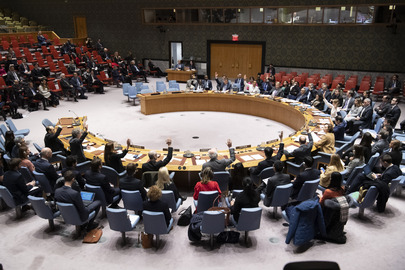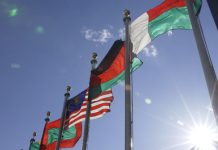Gaza: UN staff now fainting from hunger, exhaustion; WHO worker is detained
In Gaza, babies now have to wear plastic bags instead of nappies because of shortages and UN staff have been fainting from hunger and exhaustion, the UN agency for Palestinian refugees, UNRWA, said on Tuesday.
In a related development, the UN human rights office announced that more than 1,000 people seeking aid in Gaza have been killed since the private Gaza Humanitarian Foundation – GHF – distribution hub opened in late May, supported by the US and Israel.
UNRWA Director of Communications Juliette Touma described the non-UN GHF aid hub as a “death trap”:
“Snipers open fire randomly on crowds, as if they’re given a licence to kill. It’s a massive hunt of people in total impunity… Humanitarian assistance is not the job of mercenaries.”
Speaking from Amman, Ms. Touma stressed that seeking food “has become as deadly as the bombardments”. Regarding the lack of nappies and other basic everyday items, she insisted that UNRWA still has 6,000 lorry-loads of supplies waiting in Jordan and Egypt for clearance to enter Gaza.
South Sudan’s hunger crisis worsens amid ongoing conflict, climate shocks
South Sudan’s dramatic hunger crisis is worsening and millions of people there could miss out on assistance because of a lack of funding for humanitarian work globally, the UN World Food Programme (WFP) said on Tuesday.
Earlier this month, the UN agency began airdropping supplies in Upper Nile state after conflict forced families from their homes, pushing communities to the brink of famine.
Nationwide, half of South Sudan’s people – which is more than 7.7 million – are officially classified as food insecure by UN partner the IPC platform. This includes more than 83,000 who face “catastrophic” levels of food insecurity.
“The scale of suffering here does not make headlines but millions of mothers, fathers and children are spending each day fighting hunger to survive,” said WFP Deputy Executive Director Carl Skau, after his visit to South Sudan last week.
The worst-hit areas include Upper Nile state, where fighting has displaced thousands and relief access is restricted. Two counties are at risk of tipping into famine: Nasir and Ulang.
South Sudan is the world’s youngest country after gaining independence in 2011. This gave way to a brutal and devastating civil war which ended in 2018, thanks to a peace agreement between political rivals: it’s has largely held, but recent political tensions and increased violent attacks – especially in Upper Nile state – threaten to return the nation to conflict.
Chikungunya: Urgent action needed as global cases surge, says WHO
The mosquito-borne virus Chikungunya has spread to 119 countries where more than 5.6 billion people are at risk.
That’s the latest worrying update from the UN World Health Organization (WHO), which said on Tuesday that outbreaks could infect up to 75 per cent of vulnerable populations and overwhelm healthcare systems.
Symptoms of the disease are high fever, severe joint pain and fatigue; up to 40 per cent of those infected develop long-term disabilities.
Recent outbreaks in the Reunion islands and Mauritius have been linked to transmission in France and Italy.
WHO’s Dr. Diana Volkers Alvarez warned that chikungunya can spread quickly and that its symptoms are debilitating. In rare cases it can be deadly for the elderly and newborns, she said:
“Chikungunya can cause very rapid and large outbreaks infecting up to three-quarters of the population…and it can put pressure on healthcare systems.”
As there is no specific treatment for chikungunya, Dr Volkers Alvarez said that it is critically important to stop it spreading by using insect repellents, protective clothing and removing mosquito breeding sites.
The UN health agency also urges all countries to support vaccine development as a global health priority.
Daniel Johnson, UN News.
Music composed and produced by Joachim Harris. All rights reserved.
Source of original article: United Nations (news.un.org). Photo credit: UN. The content of this article does not necessarily reflect the views or opinion of Global Diaspora News (www.globaldiasporanews.com).
To submit your press release: (https://www.globaldiasporanews.com/pr).
To advertise on Global Diaspora News: (www.globaldiasporanews.com/ads).
Sign up to Global Diaspora News newsletter (https://www.globaldiasporanews.com/newsletter/) to start receiving updates and opportunities directly in your email inbox for free.





























